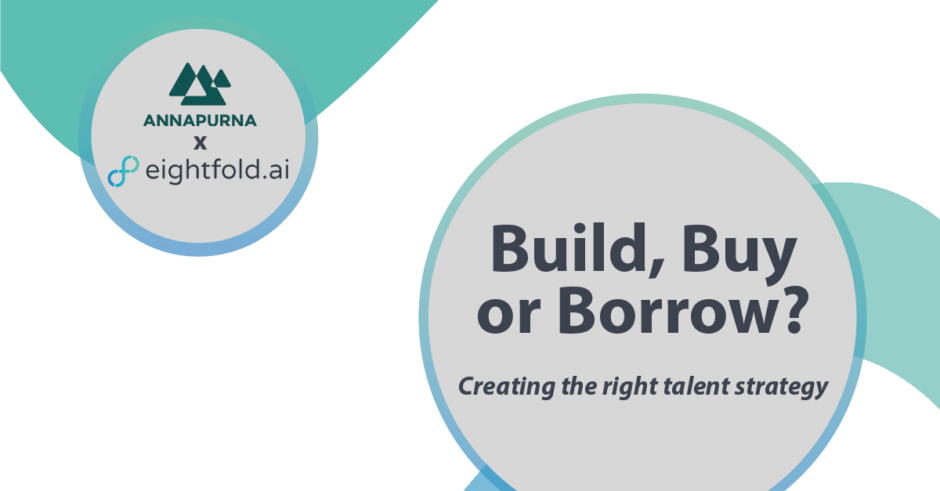There are no one-size-fits-all strategies anymore. We must ensure we are adaptable as organisations, as much as the products we bring into our organisations are flexible in themselves.
We were delighted to once again partner with Eightfold, the industry’s first Talent Intelligence Platform, for a double roundtable event which focused on crafting the right talent strategy for your business.
Hosted by James Ballard (Founder at Annapurna) and Joseph Nabarro (Associate Director at Annapurna), we were joined by Daniel Sherer (Account Executive at Eightfold) and Laura Lawson (Leading Talent Centred Conversations at Eightfold) as experts in the room, for an insightful conversation with 35+ HR professionals.
The conversation was open and interactive, bringing about the following takeaways:
Do skills trump experience?
Skills-based hiring has become the latest trend, or dare we say ‘buzzword’ in the world of HR with HR teams starting their workforce planning and skills-based journeys.
There was an open discussion around the role of skills themselves and whether as an organisation, is it even worth looking at them or do they become
Identifying skills gaps requires more than just looking at current needs; it involves forecasting what skills will be crucial in the future. The rapidly changing nature of industries and the workforce brings about a variety of additional challenges, which have to be aligned with a myriad of macro-economic factors. Across the 2 roundtables were HR professionals representing a variety of issues that from an outsider looking in, may consider everyone to have different issues, yet when asked the same question, the same issues arise regardless of industry.
Companies need to consider not just the present skills needed but also anticipate future trends and shifts in required competencies. This approach ensures that the business remains competitive and well-prepared for upcoming challenges.
What is the currency of a skill? Is the experience or qualification worth more?
What truly is skills-based hiring? Is it hiring based on skills or is it connecting your recruitment to future business plans?
Adopting a Holistic and Agile Talent Strategy
A successful talent strategy combines building internal talent, buying expertise from the market, and borrowing skills as needed. This holistic approach enables organisations to be flexible and responsive to changing market demands.
Agile strategies involve reskilling and upskilling current employees, thereby reducing reliance on external hires and potentially lowering costs. Additionally, this strategy emphasises the importance of adaptability, encouraging businesses to continuously refine their talent approaches to meet evolving needs.
There was a point raised around the table regarding the potential impact of reskilling. A lot of talk around reskilling is all positive and forward-thinking, however, when an individual is reskilled or unskilled, we must think about the impact of what that lost skill means.
2023 and 2024 have seen many organisations being impacted by downsizing and redundancies. If we can forward plan as organisations and use budgets for reskilling rather than redundancies, the role of firing and hiring can be seen as one resulting in rather than looking at what you don’t need now, looking at what you do need in the future.
We should be defining the core skills that our industry/organisation needs and then looking at prevailing/demising skills over the next 2-5 years. From this, we then understand whether we have these skills internally or whether we need to build/borrow/buy.
We must strive to be nimble organisations, with a focus on flexibility.
It shouldn’t be a paradox whether its a Profit or People focused role
Empowering HR to move beyond administrative roles has been on the discussion table for several years now. To maximise talent agility, HR must transition from traditional administrative functions to strategic advisory roles. This shift allows HR professionals to focus on developing and implementing talent strategies that align with business goals.
By understanding the currency of skills—balancing experience with qualifications—HR can provide valuable insights into workforce planning, talent development, and succession planning. This evolution is critical for HR to contribute meaningfully to business growth and innovation.
The HR function will always be people-focused but we must use technology to facilitate efficiencies and to get a human outcome.
Implementing skills as a language into organisation is behavioural change, it will inevitably make people feel uncomfortable. HR must become the agents for change.
Jobs don’t have skills, people have skills. As soon as we can get past that, we can win as a business. We must be understanding of skills and talent and use this to start solving different problems.
There is a significant importance of a forward-thinking, adaptable approach to talent management, where understanding and predicting skill requirements are as crucial as executing effective strategies to address them.




